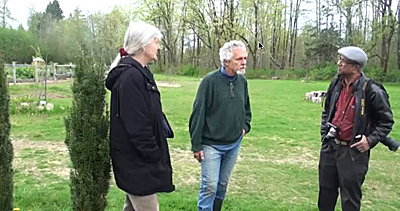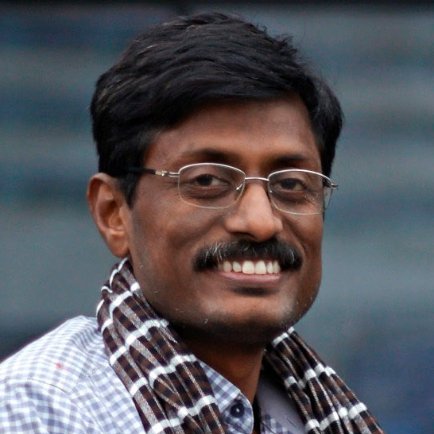Presenting an audio podcast and a series of video clips about Dr. Thierry Vrain, organic farmer and retired genetic engineer. He explains how the GMO technology is based on a faulty assumption that has since been proven wrong by more recent study of genome ecosystem of living organisms.

Tony, Thierry & Chanchal
Thierry lives in lovely Comox Valley on the east coast of Vancovuer Island, in the Canadian province of British Columbia.
In these video clips, myself, Anu, and Peggy visit the Innisfree farm, or Thierry Vrain and Chanchal Cabrera. Chanchal was busy teaching a class in her farm.

Dr. Vrain with Peggy and Tony in his farm
Thierry took us around Chanchal’s Teaching garden, and later around his organic farm and discussed how and why of organic farming.
The talks covered chemical free organic farming, sensible gardening practices, as well as a lot of science and experience. Peggy added value to the tour by adding her knowledge and experience into the discussion, including pointers to how things are in Assam, India and how things need to improve, so that pesticides can be taken out of the equation and healthy soil can be preserved and nourished without the need for factory produced toxic chemicals or fertilizers.
Thierry has been many things in his professional life. But for us, his most notable knowledge comes from plant pathology, molecular biology and his experience as a genetic engineer, along with his knowledge that the GMO science is based on old and wrong perceptions of the nature and function of genes. This knowledge is not discussed in this opening section of the video. You need to stay tuned and watch the rest as they are edited and put up.
Thierry Vrain – Part 1 : Thierry talks to us on medicinal gardens, plants and food. If chosen well, how our food and lifestyle can cure some decease, even repress or slowdown Cancer. Cancer, which might be considered a decease of old age, is coming up more frequently among the young, and is related to stress, though it has a genetic base. The stress can be from harmful chemicals, physical stress, emotional trauma, could be related to how one lives his/her life, etc. Then Thierry goes on to describe the garden and its mulch, and how he makes compost out of rotting hay, seaweed, dead leaves etc. And then he shows us how to use natural ingredients to conserve soil health, and explains his own training and work background.
There are many more video clips to be added shortly, so watch this space.
[youtube r48HqSEQYfA]
Thierry Vrain – Part 2: We get a tour around the farm, starting with the meditating labyrinth that they made in the corner which is full of gravel and not suitable for growing vegetables. The adjacent pond is blue-green from the minerals in the clay at the bottom of the pond. Moving on to the vegetable garden, Thierry explains how some medicinal plants are also good as source for mulch that keeps the sun from drying out the soil, and helps growth of micro organisms to work on the fallen vegetation and turn it all into soil nutrient. There is also a fast scene of Thierry’s cat surviving an eagle attack.
[youtube S6X1dKnAgAQ]
Thierry Vrain – Part 3: We spend 21 minutes out in Thierry’s farm and learn about soil biology and the role played by bacteria, fungi, and how photosynthesis was invented by the bacteria before implanting themselves into evolving trees that had the chloroplast. He and Peggy join talks with Tony in explaining how the sunlight and CO2 are worked on by the trees along with nutrients from the soil, and how the tree takes and also gives back into the soil sugars and proteins for the bacteria and fungi that in turn give the plants the minerals it needs. It is necessary to understand the relationship, so that agriculture can be understood and why industrial chemical or GMO are not the solution to either improve plant biology, or soil condition or nutrition value in our food.
[youtube TDuKW4c1cEU]
Exposing the faulty science behind GMO
Thierry Vrain – Part 4: In this video of under 12 minutes, Dr. Thierry Vrain comes to describe his profession as a soil biologist turned genetic engineer, and explained how, since the human genome project was completed in 2002, it dawned on folks on the complexity of genes that shattered the old idea of a one-gene one-protein theory. This also meant, the GMO technology used by the biotech industry was based on a faulty assumption of how genes work, and how dangerous the consequences of that faulty science can be.
[youtube _haVyyFfnA8]
PODCAST : At bottom of this page, and also on iTunes, is the 12 and half minute audio podcast of the above video #4, on GMO.
 Here we include a podcast involving a talk with Dr. Ramu of India, on sustainable agriculture.
Here we include a podcast involving a talk with Dr. Ramu of India, on sustainable agriculture.

